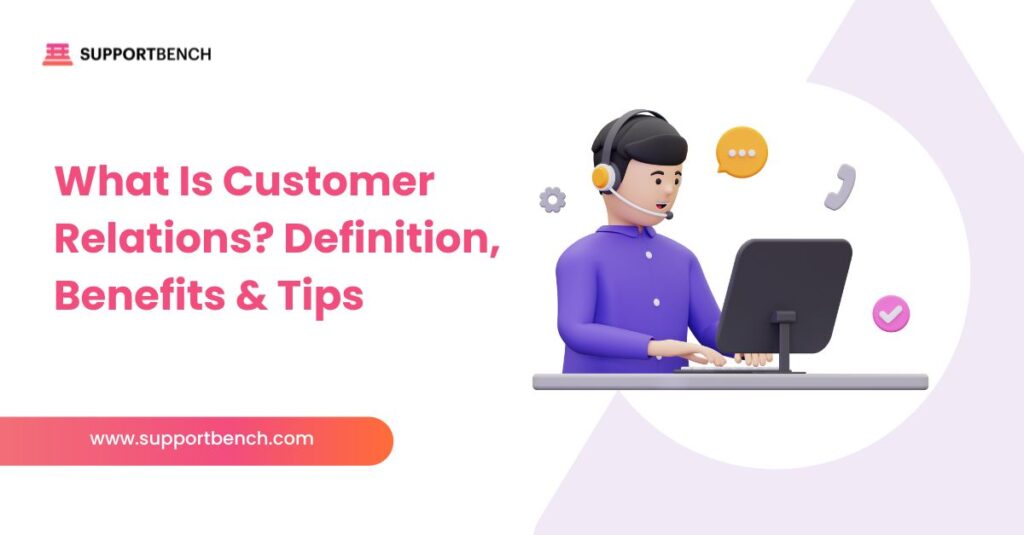Strong customer relationships are at the heart of every successful business. Success is no longer just about delivering quality products or services. It’s also about creating positive, reliable interactions that build trust and encourage customers to return.
The way a company handles questions, resolves problems, and communicates with its audience can determine whether it thrives or struggles.
Strong customer relations drive retention, loyalty, and revenue. Here’s a clear look at what they mean, why they matter, and how Supportbench helps businesses improve customer experiences.
At a Glance:
Customer relations means building trust, loyalty, and retention through consistent, meaningful interactions. Key KPIs include NPS, CSAT, LTV, and retention rate. With tools like Supportbench, businesses can unify data, improve customer experiences, and strengthen long-term relationships.
Understanding Customer Relations and Why It Matters for Your Business

Customer relations refers to the way a business communicates and interacts with its customers to create lasting relationships.
It includes strategies and practices that help a company understand customer needs, meet those needs effectively, and encourage loyalty.
Unlike customer support, which focuses on solving immediate issues, customer relations take a broader view by nurturing trust and loyalty throughout the entire customer lifecycle, from initial awareness to post-purchase engagement.
Customer Relations vs. Customer Relationship
While the terms are similar, they have slightly different meanings:
Aspect | Customer Relations | Customer Relationship |
Focus | Ongoing Strategy to Build and Maintain Strong Connections | Individual Connection with a Specific Customer |
Scope | Company-Wide, Involving Marketing, Support, Sales, and Product Teams | Personal Interactions Between a Business Representative and a Customer |
Goal | Build Trust, Retention, and Lifetime Value | Resolve Issues and Create a Positive Experience |
Example | Loyalty Programs, Proactive Engagement Campaigns | A Support Agent Solving a Single Issue |
In short, customer relations are the overarching plan and processes, while a customer relationship is the direct, one-on-one bond between your business and each individual customer.
Customer Service vs. Customer Support vs. Customer Relations
Understanding customer service, support, and relations highlights differences in goals, approaches, and long-term business value.
Aspect | Customer Service | Customer Support | Customer Relations |
Goal | Enhance Customer Experience Through Personalized Help | Resolve Specific Technical or Product Issues | Build Long-Term Trust and Loyalty |
Approach | Proactive and Reactive | Reactive | Strategic and Proactive |
Example | Personalized Follow-Up Calls | Fixing a Broken Feature | Loyalty Program, Onboarding Campaigns |
Importance of Effective Customer Relations
Modern consumers expect more than just good products. They care about the experience at every stage of their interaction with a company, from initial contact to post-purchase follow-up.
According to a Microsoft study, 55% of consumers expect better customer service year over year. This means businesses must continually raise their standards to meet growing expectations.
Effective customer relations:
- Build trust that lasts beyond a single purchase.
- Strengthen retention rates by giving customers reasons to stay.
- Improve communication across departments like support, marketing, and product teams.
- Provide a clear understanding of customer needs to improve services and processes.
➤ Supportbench Tip: A unified platform like Supportbench centralizes data and ensures every team has access to the same customer history, which creates consistent experiences across all touchpoints.
To see how customer relations support the entire journey, here’s a look at the customer lifecycle in action:

Benefits of Positive Customer Relationships
Here’s how strong customer relations benefit your business:
✔ Higher Retention: Satisfied customers are more likely to return and recommend your business to others.
✔ Increased Loyalty: When customers feel valued, they’re less likely to switch to competitors.
✔ Improved Reputation: Positive reviews and social media mentions strengthen your brand image.
✔ Price Stability: Strong customer experiences add value to your brand, reducing pressure to compete on price alone.
✔ Motivated Employees: Happy customers lead to more motivated teams, which in turn improve performance and morale.
✔ Word-of-Mouth Marketing: Satisfied customers share their experiences, helping to grow your business organically.
Customer Relations Metrics (KPIs)
Tracking the right metrics helps you measure the success of your customer relations strategy:
Metric | Purpose |
NPS (Net Promoter Score) | Measures Customer Loyalty and Likelihood to Recommend Your Business. |
CSAT (Customer Satisfaction Score) | Evaluates How Satisfied Customers Are with a Specific Interaction or Service. |
LTV (Lifetime Value) | Predicts the Total Revenue a Customer Will Generate Over Their Relationship with Your Business. |
Retention Rate | Tracks How Well Your Business Keeps Customers Over Time. |
These numbers guide decision-making and show where improvement is needed.
Tips to Build Positive Customer Relationships
Creating strong customer relations requires consistent effort and attention to detail.
Here are six practical strategies to improve your approach:
1. Prioritize Employee Training
Your employees are the face of your business. Training should focus on both soft skills (active listening, empathy, clear communication) and problem-solving techniques. In addition to workshops and online modules, companies can also use resources like a book customer service guide to provide employees with structured knowledge and practical examples they can refer back to at any time.
Ongoing training keeps teams aligned with company policies and ensures consistent, high-quality service.
2. Increase Resolution Rates
Customers want their problems solved quickly and on the first contact. Track your First Contact Resolution (FCR) rate to measure how often issues are solved on the first attempt. Improving FCR builds trust and reduces customer frustration.
3. Use the Right Software
When customer inquiries increase, manual processes can’t keep up. Using customer service tools like Supportbench helps teams track interactions, manage workloads, and deliver seamless experiences.
➤ Why Supportbench: It combines CRM, ticket management, and analytics to give businesses a single view of every customer interaction.
4. Offer Self-Service Options
Not every issue requires a live agent. Providing resources such as FAQs, chatbots, and knowledge bases gives customers 24/7 access to answers, reducing wait times and support costs.
5. Be Accessible
Different customers prefer different ways of reaching your business. Offer multiple communication channels, such as phone, email, chat, and social media, to guarantee accessibility for everyone.
6. Collect Feedback and Measure Satisfaction
Regularly ask for feedback through surveys or follow-up questionnaires. Listening to customer opinions shows you value their perspective and helps you identify areas for improvement.
Metrics to track include:
- CSAT (Customer Satisfaction Score)
- NPS (Net Promoter Score)
- Retention Rate
Conclusion
Good customer relations go beyond fixing problems—they build a foundation of trust, loyalty, and long-term success.
By using the right tools and strategies, companies can create consistent, meaningful experiences that encourage customers to stay and share their positive experiences.
Tracking metrics like NPS, CSAT, and Retention Rate is only effective if you have a unified system to act on them — which is where Supportbench comes in.
Supportbench helps businesses organize customer interactions, automate workflows, and provide personalized service, making it easier to maintain strong relationships.
Try Supportbench for free today and see how it can improve your customer service processes and overall business results.










